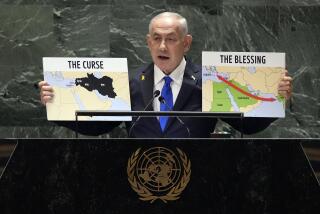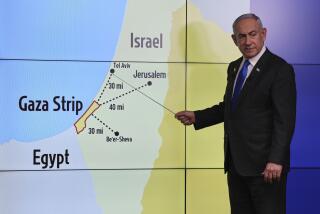Israel’s Netanyahu says he would accept a disarmed Palestinian state
JERUSALEM AND NEW YORK — Israeli Prime Minister Benjamin Netanyahu bowed to U.S. pressure Sunday and accepted the goal of a Palestinian state. But it was unclear whether the breakthrough, welcomed by President Obama, would lead to a revival of peace talks with the Palestinians, who immediately rejected the sharp limits Netanyahu would place on their nation’s sovereignty.
Netanyahu said Israel needed international guarantees that a Palestinian state would not have its own military. In his first policy speech on the conflict since taking office 10 weeks ago, he also insisted that the U.S.-backed Palestinian Authority give up claims to Jerusalem as a future capital, recognize Israel as a Jewish state and “impose law and order” on the Hamas militants who run the Gaza Strip.
Although those demands were not explicitly held out by Netanyahu as conditions for resuming American-brokered peace negotiations, Palestinian leaders interpreted them as such and rejected his call to start talks immediately. But the White House said Obama hailed the speech as an “important step forward” and would continue working to bring the two sides together.
Netanyahu’s half-hour address, televised in Israel during prime time, staked out a strikingly different approach to the conflict than the one Obama offered 10 days earlier in an address to the Muslim world from Cairo. He again rebuffed Obama’s call for a halt to the growth of Jewish settlements in the West Bank as a first step toward engaging Arab states in a broad regional peace effort.
Speaking two days after Iran’s government proclaimed the reelection of its hard-line leader, Netanyahu said the threat of a nuclear-armed Iran was “the greatest danger confronting Israel” and the region. And he said the “fundamental condition” for ending the Israeli-Palestinian conflict was not stopping Jewish settlements but securing “a public, binding and honest Palestinian recognition of the state of Israel as the nation-state of the Jewish people.”
But it was his turnabout on Palestinian statehood, qualified though it was, that marked a watershed. The staunchly conservative leader had spent more than two decades in public life rejecting a “two-state solution” as other Israeli governments and successive U.S. administrations embraced that goal. Sunday was the first time he brought himself to utter the word “state” in public to define the homeland Palestinians would get in a peace accord.
In falling closer into line with the American president on one of his top foreign policy goals, Netanyahu took a risk that his right-leaning coalition might rebel. Leaders of Jewish Home said late Sunday that they might pull their small party out of the government to protest what they called a violation of agreements struck when the coalition was formed.
But leaders of bigger parties that hold the coalition together swallowed hard, aware of the need to repair a rift with Israel’s superpower ally and apparently placated by the rigid terms spelled out in Netanyahu’s speech.
The prime minister said Israel would not tolerate a Palestinian state with its own army, control of its own borders and airspace, and the ability to make defense pacts with other nations. For the first time, he said Israel wanted the U.S. and other countries to guarantee the future state’s demilitarization.
“If we receive this undertaking, for demilitarization and the security arrangements required by Israel, and if the Palestinians recognize Israel as the nation-state of the Jewish people,” Netanyahu said, “we will be prepared as part of a future peace accord to reach a solution of a demilitarized Palestinian state alongside the Jewish state.”
Palestinian leaders dismissed Netanyahu’s call to begin peace talks “immediately, without preconditions,” as a nonstarter.
“Netanyahu left us with nothing to negotiate, as he systematically took nearly every issue off the table,” said Saeb Erekat, the chief Palestinian Authority negotiator. “Nor did he accept a Palestinian state; instead, he announced a series of conditions and qualifications that render a viable, independent and sovereign state impossible.”
Nabil abu Rudaineh, an aide to Palestinian Authority President Mahmoud Abbas, said the speech was “not enough to start a serious peace process.”
Ahmad Bahar, a Hamas leader in Gaza, said the speech “proves that resistance is the only way for the Palestinians to regain their legitimate rights.” Hamas’ alliance with Iran, hostility to Israel and violent opposition to Abbas’ administration make Israelis skeptical that any peace accord can work.
It remains to be seen whether the tough positions laid out by Israel and Abbas’ aides Sunday represent a continued standoff or the beginning of posturing for a new round of peace talks.
“Netanyahu’s speech leaves me confused,” said Yossi Alpher, co-editor of bitterlemons.org, an online forum on Israeli-Palestinian issues. “Is he saying there will be no peace talks unless his conditions are agreed to in advance? I think he was deliberately vague.”
The White House said Obama would forge ahead with efforts to end the decades-old conflict.
“The president is committed to two states, a Jewish state of Israel and an independent Palestine, in the historic homeland of both peoples,” said White House Press Secretary Robert Gibbs in a statement. “He believes this solution can and must ensure both Israel’s security and the fulfillment of the Palestinians’ legitimate aspirations for a viable state, and he welcomes Prime Minister Netanyahu’s endorsement of that goal.
“The president will continue working with all parties . . . to see that they fulfill their obligations and responsibilities necessary to achieve a two-state solution.”
Israel and the Palestinian Authority held peace talks in the final year of the Clinton administration and again late in the presidency of George W. Bush. The latter round was suspended in January with the two sides disagreeing over the key issues of borders, security, conflicting claims to Jerusalem and the status of Palestinians displaced from their homes during the war that followed Israel’s founding in 1948.
Yossi Beilin, a former Israeli peace negotiator, said previous Israeli governments also had insisted, and Palestinian negotiators had quietly acknowledged, that a Palestinian state would be demilitarized. Likewise, he said, there has long been a tacit understanding that a final peace accord would recognize Israel as a Jewish state and that, consequently, the bulk of the Palestinian refugees and their descendants, now numbering in the millions, would not be permitted to return to Israel.
“But stating these conditions upfront only causes the other side to resist and ensures that there won’t be an agreement at all,” Beilin told Israel Radio. “With his tone and words, especially on the settlements, Netanyahu makes an agreement practically impossible.”
The prime minister restated his pledge that Israel would refrain from building new settlements and expropriating land to expand existing ones. But he said he would not rule out building new homes for growing settler families on land already occupied by the state.
Addressing Obama’s demand to halt all construction, he added, “The settlers are neither the enemies of the people nor the enemies of peace. Rather, they are an integral part of our people, a principled, pioneering and Zionist public.”
He also took issue with a passage from Obama’s Cairo speech that associated Israel’s creation directly with the Holocaust. “Our right to form our sovereign state here in the land of Israel stems from one simple fact,” Netanyahu said. “The land of Israel is the birthplace of the Jewish people.”
But he added that Israel must recognize that millions of Palestinians live in the heart of the West Bank, and that continued control over them is undesirable.
“In my vision of peace, in this small land of ours, two peoples live side by side,” he said. “Each will have its own flag, its own national anthem, its own government. Neither will threaten the security or survival of the other.”
--
Sobelman is a special correspondent. Special correspondent Maher Abukhater in Ramallah, West Bank, contributed to this report.
--
(BEGIN TEXT OF INFOBOX)
Middle East milestones
Israel’s declaration of statehood in May 1948 led to decades of conflict with the Palestinians over the land. In the 1990s, the goal of an independent Palestinian state alongside Israel became the basis for peace negotiations.
Here is how the conflict over statehood evolved:
November 1947: The United Nations approves a British plan to partition Palestine into Arab and Jewish states. The Arabs reject it.
May 1948: Israel declares its independence. An estimated 700,000 Palestinians are displaced.
June 1967: The 1967 Middle East War ends with Israel’s capture of the West Bank and East Jerusalem from Jordan, the Sinai peninsula and Gaza Strip from Egypt, and the Golan Heights from Syria.
December 1988: Palestinian leader Yasser Arafat accepts the goal of an independent Palestinian state in the West Bank and Gaza Strip alongside Israel.
September 1993: As part of the Oslo peace accords, Arafat’s Palestine Liberation Organization formally recognizes Israel’s right to exist, laying the groundwork for talks on a Palestinian state.
July 2000: Prime Minister Ehud Barak makes Israel’s first offer of statehood to the Palestinians in talks brokered by President Clinton. Arafat rejects the terms.
Source: Times reporting
More to Read
Sign up for Essential California
The most important California stories and recommendations in your inbox every morning.
You may occasionally receive promotional content from the Los Angeles Times.










